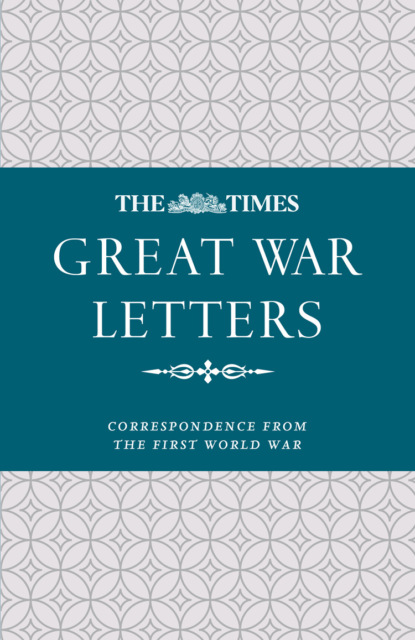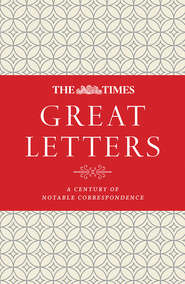По всем вопросам обращайтесь на: info@litportal.ru
(©) 2003-2024.
✖
The Times Great War Letters: Correspondence during the First World War
Автор
Год написания книги
2019
Настройки чтения
Размер шрифта
Высота строк
Поля
Popular authors had stoked fears of spies even before the war; there were said to be 60,000 Germans and Austrians living in Britain when the war started.
HINTS TO RECRUITS
22 September 1914
SIR,—AS ONE WHO volunteered and went through part of the South African War as a Tommy, I hope the following tips may prove useful. They may be obvious or controversial, but I give them for what they are worth, and because I know that to some at least they will prove useful.
First of all I strongly recommend all now enlisting to possess themselves of a good strong pair of leather gloves—such as the old omnibus drivers used to wear. The nights will soon be getting cold, windy, and frosty, and I know that when in South Africa I would have given anything when on sentry-go for a pair of such, for the barrel of one’s rifle was ofttimes icy, and one’s hands got too cold to hold it properly. Many now becoming soldiers, too, are not used to manual labour. Put a company of these to dig a “one hour’s shelter trench”—i.e., to work hard for one hour with pick and spade, and then count the blistered hands. The spade, we all know now, is almost as important as the rifle, and gloves will help here. Further, in the rough and tumble of war hands will get cut and torn, and sometimes fester. Gloves then again useful. And finally, with much crawling to do over possibly gorse and thorn, strong gloves certainly save the hands, and so make for efficiency. But, to save myself from an obvious reply, kid is certainly not the leather such gloves should now be made of. Another point. Campaigning, a fork is a luxury, but what you do want is a spoon, a good strong clasp-knife, and a tin-opener. I was in Switzerland last week, and when there bought one of the knives that every Swiss soldier is supplied with. It is extremely practical, and contains a good strong blade, a tin-opener, a screw-driver, and a piercer or marline-spike, all strong and well made and not too heavy. A very useful gift, too, is a well-made pair of folding pocket scissors.
In South Africa those of us were lucky who had the chance of buying a strong, fairly large enamelled iron mug, which we hung on to the strap of our water-bottle by the handle. It was handy as an extra article of mess equipment, for filling one’s bottle when streams were too shallow, and also for getting in a hurry a dollop of anything that was going—even a drink from a stream or a lucky pull from a water-cart. The regulation mess tin—and what a practical and handy article this is—cannot be got at without taking off one’s kit, and besides, in our case, used often to contain our day’s ration of meat.
Bootlaces, bachelor’s buttons, safety pins, a large hook and eye or two, and a few split copper rivets may, of course, obviously be useful, and a good tip is to sew two brace buttons side by side in place of one on the trousers, and to start off with only the very best braces.
The loss of a button or the breaking of a brace may temporarily put a man quite out of action. For papers, wrap them in a large square of green oiled silk. This “kind of” gets stuck together in the pocket, and my papers, after many months in the field, were quite legible and not much the worse at the end from the damp coming from both within and without. One sentence more. Chocolate is good—very, very good—but to many one thing is better. Good hot, strong peppermint drops; not bull’s-eyes—they are too sticky—but the hard white sort. They are grateful and comforting if you like when one’s hungry and cold. But some may prefer chocolate—so let’s send both.
Yours faithfully,
RIGBY WASON, late O.R.Sgt., Inns of Court O.T.C.
THE VALUE OF COCA LEAVES
28 September 1914
SIR,—IN YOUR ISSUE of to-day’s date you have a letter recommending coca leaves. It is well that the public should be warned that cocaine is a most dangerous drug. The cocaine vice has only recently been introduced into India, but it is now in many places recognized that the cocaine habit is a much more serious vice than either opium or hemp. It is therefore most seriously to be hoped that no individual hearing of the marvellous effects of this drug will unwittingly allow himself to become a victim to the vice.
Yours faithfully,
C. STREATFEILD, late District Magistrate, Benares, India
SHILLINGSTONE’S RECORD
30 September 1914
SIR,—THE LITTLE VILLAGE of Shillingstone in Dorsetshire, with a total population of 575, has sent 66 men to the Colours. It would be interesting to know whether any other village of the same size has beaten this record.
Yours faithfully,
BASIL THOMSON
TEMPERANCE AMONG WOMEN
6 October 1914
SIR,—IN YOUR ISSUE of to-day (October 3) your correspondent Margaret Taylor pleads for pressure to be put on Government for earlier closing of publichouses, a plea that cannot be too strongly endorsed by the women of England. When we see the increasing numbers of our poorer sisters in and out of gin palaces, we realize the immediate possibility of the degeneration of the homes our men “have left behind them.”
When the first war panic burst the dread of supply stoppage caused hundreds of homes to be broken up, the women living in lodgings instead. They are now in receipt of more money than they have ever had in their lives. This, with no man at home to see to, gives them hours of the day to get through. Can we blame them if they forgather in the only social place that opens its welcoming arms to them? To save the “home-life” for our men to find on their return, can we not take rooms in the most congested parts of our great cities, encourage our women to meet there, supply them with papers, the latest war news hung on the walls, paper, pen, and ink, free of charge, coffee, cocoa, and tea to be had at cost price? With cheery fires and simple amusements at night we shall soon find our women ceasing to care for the doubtful joys of the gin palaces. This plan has been carried out most successfully along our coasts, for the concentration camps, and been much appreciated by the men. These men are under discipline; our women are not; therefore their need is greater. The whole scheme can be carried through at very little expense—each local centre managed by a local committee. As we are starting immediately in Hammersmith, I shall be glad to give all details to anyone who is willing to inquire.
Yours, &c.,
EMILY JUSON KERR
THE DEATH OF MARK HAGGARD
10 October 1914
SIR,—IN VARIOUS PAPERS throughout England has appeared a letter, or part of a letter, written by Private C. Derry, of the 2nd Battalion, Welsh Regiment. It concerns the fall of my much-loved nephew, Captain Mark Haggard, of the same regiment, on September 13 in the battle of the Aisne.
Since this letter has been published and, vivid, pathetic, and pride-inspiring as it is, does not tell all the tale. I have been requested, on behalf of Mark’s mother, young widow, and other members of our family, to give the rest of it as it was collected by them from the lips of Lieutenant Somerset, who lay wounded by him when he died. Therefore I send this supplementary account to you in the hope that the other journals which have printed the first part of the story will copy it from your columns.
It seems that after he had given the order to fix bayonets, as told by Private Derry, my nephew charged the German Maxims at the head of his company, he and his soldier servant outrunning the other men. Arrived at the Maxim in front of him, with the rifle which he was using as Derry describes, he shot and killed the three soldiers who were serving it, and then was seen “fighting and laying out” the Germans with the butt end of his empty gun, “laughing” as he did so, until he fell mortally wounded in the body and was carried away by his servant.
His patient and heroic end is told by Private Derry, and I imagine that the exhortation to “Stick it, Welsh!” which from time to time he uttered in his agony, will not soon be forgotten in his regiment. Of that end we who mourn him can only say in the simple words of Derry’s letter, that he “died as he had lived—an officer and a gentleman.”
Perhaps it would not be inappropriate to add as a thought of consolation to those throughout the land who day by day see their loved ones thus devoured by the waste of war, that of a truth these do not vainly die. Not only are they crowned with fame, but by the noble manner of their end they give the lie to Bernhardi and his school, who tell us that we English are an effete and worn-out people, befogged with mean ideals; lost in selfishness and the lust of wealth and comfort. Moreover, the history of these deeds of theirs will surely be as a beacon to those destined to carry on the traditions of our race in that new England which shall arise when the cause of freedom for which we must fight and die has prevailed—to fall no more.
I am, Sir, your obedient servant,
H. RIDER HAGGARD
PROFESSIONAL FOOTBALLERS AND THE WAR
14 October 1914
SIR,—I AM WRITING to suggest that the professional footballers of the hundreds of clubs throughout the country should be allowed to enlist under certain conditions which might be arranged between the War Office and the Football Association. The men might be allowed to take part in the Saturday fixtures both at home and away, arrangements being made that men of the London clubs should be trained in and near the metropolis, those of the Lancashire clubs in and near Manchester and Liverpool, &c. Possibly a professional football brigade could be formed, and as their training will take a long time their services will not be required out of the country until the football season is practically over. Hundreds of amateur footballers, and other sportsmen have already joined the ranks, and surely the professional will not be less patriotic than his fellows, and will be proud to help to keep the flag flying and the ball rolling at the same time.
Yours faithfully,
WILLIAM A. BECKETT
INVASION BY AIR
16 October 1914
SIR,—ONE DOES NOT want to raise an unnecessary scare, but in the case of invasion by Zeppelins the total or partial obscuration of the lights of London will be of little avail if an airship is able to pick up a guide on the coast to direct it on its way. Is there at present anything to prevent some of the well-to-do aliens who show such an affection for the east coast from guiding the invader by driving a motor with a bright headlight along the road to London? The hour and place of the airship’s arrival might very well be arranged beforehand, and the car could easily be identified from above by preconcerted distinguishing marks.
Yours truly,
MAKE SURE
GERMAN SPIES
19 October 1914
SIR,—I WAS GLAD TO read your article to-day in The Times on German espionage and preparation for this war. Here is an instance. About three years ago I was staying in Norfolk, and I asked a friend of mine if the Germans had ever found out a place called Weybourne, on the coast, where Nelson said was the place to land an invading force for England. My friend answered: “Found it out; the Germans have bought land there and built a hotel.” About 10 days ago I was motoring along the coast there and was stopped several times by the cycle corps guarding the coast. I happened to ask one of the men how much coast they looked after, and he told me from Hunstanton to Weybourne. I said, “There is a hotel at Weybourne which belongs to the Germans.” And he replied,“I don’t know about that; but a short time ago we made a raid on the hotel and found several Germans in it.” I send you this in case it may be of interest to know preparations have been made in this country just as in France and Belgium.
Yours faithfully,
J. B. STRACEY-CLITHEROW








